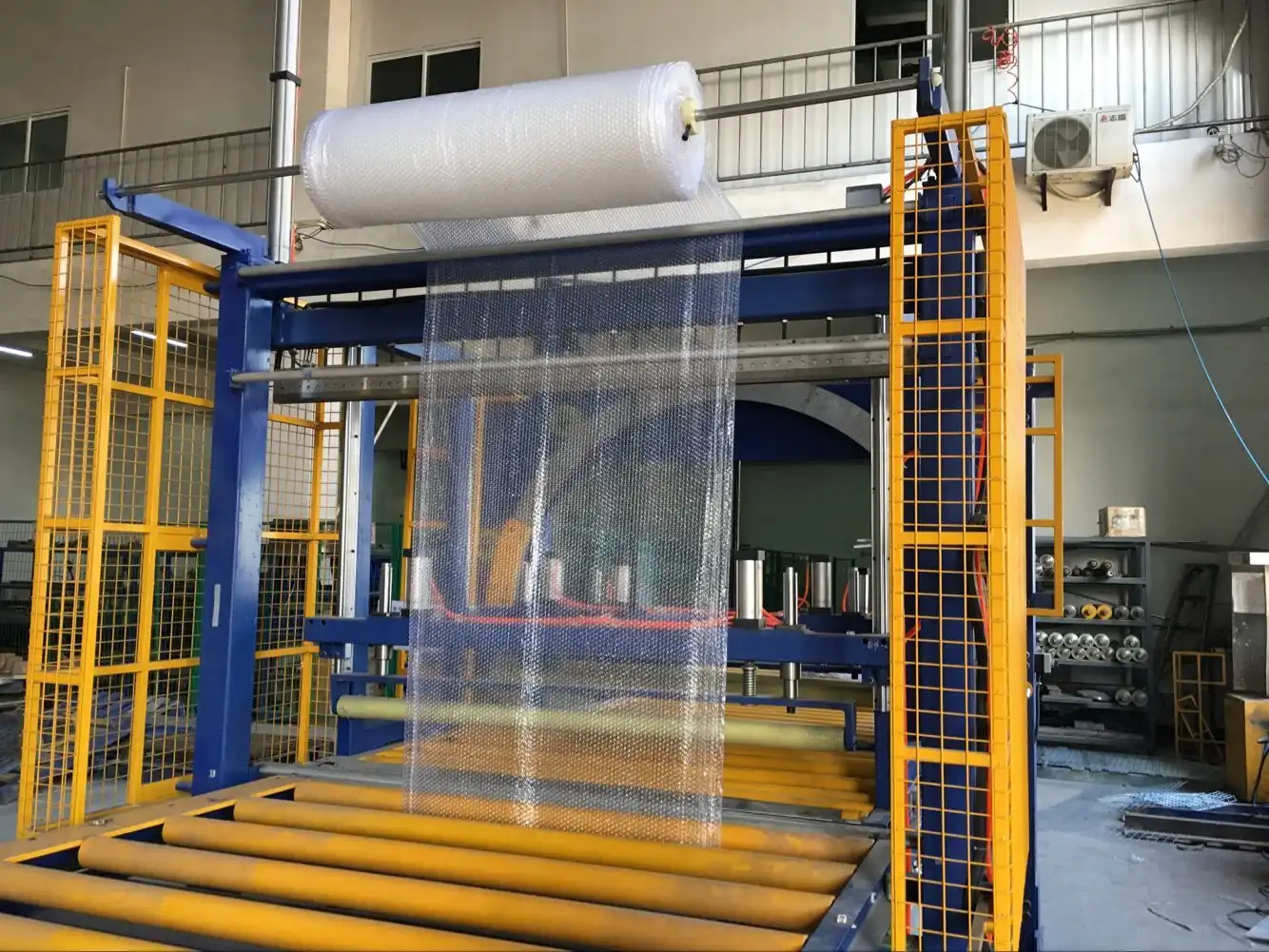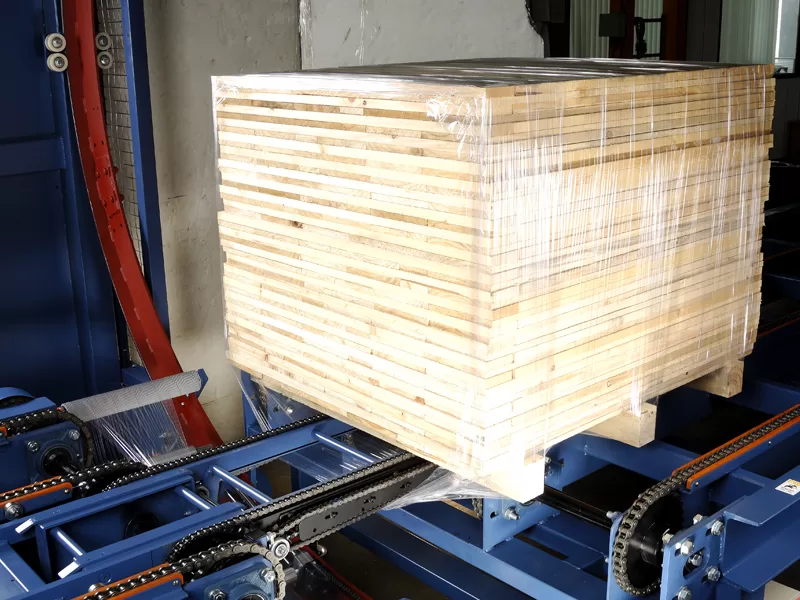How to Assess the Automation Levels in Six-Sided Horizontal Orbital Stretch Wrappers for Board Bundles
As
industries strive to improve operational efficiency and reduce labor
costs, automation has become a critical component in packaging
processes. For businesses that handle large or bulky items, such as board bundles, a six-sided horizontal orbital stretch wrapper offers an ideal solution for automating the packaging process. However,
not all stretch wrappers are created equal in terms of automation. The
level of automation a machine offers can significantly affect your
productivity, labor requirements, and overall packaging quality.
This article will guide you through the process of assessing the automation levels in six-sided horizontal orbital stretch wrappers, helping you make an
informed decision when selecting the right equipment for your
operations.
1. Understanding Automation Levels in Stretch Wrapping
Automation
in stretch wrapping refers to the machine’s ability to handle various
packaging tasks without human intervention. Depending on the model and
configuration, these machines can wrap products, adjust film tension,
cut and seal film, and handle various product sizes and shapes
autonomously.
Automation levels in stretch wrappers generally fall into three categories:
-
Manual: Requires significant operator involvement.
-
Semi-Automatic: Balances operator control with some automation.
-
Fully Automatic: Requires minimal human intervention.
Each
level of automation has its advantages and is suited to different types
of operations. To choose the best solution for your business, it's
crucial to assess how each level can impact your productivity and
cost-effectiveness.
2. Manual vs. Semi-Automatic vs. Fully Automatic Wrappers: Key Differences
Understanding the difference between manual, semi-automatic, and fully automatic orbital stretch wrappers is the first step in assessing automation levels.
2.1 Manual Wrappers
Manual
wrappers require operators to perform most of the tasks involved in the
wrapping process. The operator typically loads the board bundle onto
the machine, manually controls the film application, and cuts and
secures the film at the end of the cycle. While manual machines offer
flexibility, they are time-consuming and labor-intensive, making them
less ideal for high-volume operations.
Pros:
-
Low upfront cost
-
Suitable for low-volume packaging
Cons:
-
High labor costs
-
Slower packaging speeds
-
Inconsistent wrapping quality due to human error
2.2 Semi-Automatic Wrappers
Semi-automatic
wrappers provide a balance between operator involvement and automation.
In this system, the operator typically loads the board bundle, but the
machine automates key tasks such as film application, tension control,
and sometimes cutting and sealing the film. Semi-automatic machines
improve speed and reduce the physical workload while offering more
control than fully automatic systems.
Pros:
-
Reduces labor intensity
-
Increases wrapping speed and consistency
-
Suitable for medium-sized operations
Cons:
-
Still requires some operator involvement
-
Not as fast as fully automated systems
2.3 Fully Automatic Wrappers
Fully
automatic stretch wrappers require minimal human intervention. These
machines can automatically load products, adjust the film, wrap, cut,
and seal the material without operator input. A fully automated
six-sided horizontal orbital stretch wrapper is ideal for high-volume
operations, where speed and consistency are critical.
Pros:
-
Maximizes packaging speed and throughput
-
Consistent wrapping quality
-
Reduces labor costs
Cons:
-
Higher initial investment
-
Requires more maintenance
3. Factors to Consider When Assessing Automation Levels
To
determine which automation level is right for your business, you need
to consider several factors related to your packaging needs, operational
scale, and budget.
3.1 Production Volume and Throughput
The first factor to assess is your production volume.
High-volume operations will benefit more from a fully automatic
wrapper, as it minimizes labor and maximizes throughput. If you’re
packaging a large number of board bundles daily, a fully automated
system will ensure faster cycles and consistent output.
Conversely, businesses with lower packaging volumes might find that a semi-automatic machine strikes the right balance between automation and control. It provides
the speed needed for moderate throughput without the higher cost of a
fully automated system.
3.2 Operator Skill Level and Labor Availability
If
your workforce has limited experience with automated machinery, you may
want to start with a semi-automatic machine that allows operators to
maintain more control over the process. Alternatively, if your goal is
to reduce labor dependence and eliminate repetitive manual tasks, a
fully automatic wrapper is the better choice.
Automation can significantly reduce labor requirements,
which is particularly valuable for companies facing labor shortages or
rising labor costs. Fully automatic systems allow operators to focus on
higher-level tasks, improving overall productivity.
3.3 Product Complexity and Customization Needs
If your board bundles come in a variety of sizes, shapes, and materials, you need to assess how well each machine can handle product variability.
Fully automatic wrappers with smart sensors and adjustable film tension
control can automatically adjust to different product dimensions,
ensuring consistent wrapping for all items.
On the other hand,
manual or semi-automatic machines may require operators to manually
adjust settings, which could slow down production if your products vary
significantly. In this case, a fully automated machine with customizable
wrapping patterns and adjustable tension control would be the best
option for handling a diverse range of products.
3.4 Budget Constraints
Budget
is always a key consideration when investing in new machinery. While
fully automatic machines offer the highest level of productivity, they
also come with a higher initial investment. If your business is growing
but doesn’t yet require high-volume packaging, a semi-automatic machine can offer a more cost-effective solution while still providing some automation benefits.
When assessing the budget, it's essential to consider the total cost of ownership (TCO). Fully automatic machines often result in long-term savings by
reducing labor costs and improving efficiency, but semi-automatic
machines may offer a lower upfront cost and simpler maintenance
requirements.
4. Automation Features to Look For in Six-Sided Horizontal Orbital Stretch Wrappers
When evaluating different machines, it’s essential to look at the automation features that each system offers. These features will help you assess the
machine’s level of automation and its ability to meet your packaging
needs.
4.1 Automatic Film Application
In
fully automatic machines, the system will apply the film to the board
bundles without the need for operator assistance. This feature
significantly reduces labor and ensures that the film is applied
consistently, minimizing the risk of product damage due to improper
wrapping.
4.2 Film Tension Control
One of the key benefits of automation is automatic film tension control.
This feature allows the machine to automatically adjust the tension
based on the product’s size and shape, ensuring that the film is applied
securely without damaging the board bundle. Advanced tension control
systems improve wrap quality and reduce material waste.
4.3 Automatic Cutting and Sealing
Fully automatic machines often include automated cutting and sealing features, eliminating the need for operators to manually cut the film
and secure the package. This feature increases packaging speed and
ensures a clean, professional finish on each bundle.
4.4 Smart Sensors for Product Detection
Automated machines equipped with smart sensors can detect the size and shape of the board bundle as it moves through
the machine. These sensors allow the system to adjust the wrapping
process in real time, ensuring that each product receives the
appropriate level of protection.
5. Benefits of Higher Automation Levels
Investing
in a higher level of automation offers numerous benefits, particularly
for businesses that prioritize speed, consistency, and reduced labor
costs. Here are some of the key advantages of fully automated six-sided
horizontal orbital stretch wrappers:
5.1 Increased Efficiency and Throughput
Automation
significantly increases the speed at which products are wrapped,
allowing businesses to handle higher volumes of board bundles without
sacrificing quality. Fully automatic machines can run continuously,
maximizing throughput and reducing bottlenecks in the packaging process.
5.2 Reduced Labor Costs
By minimizing the need for human intervention, fully automatic machines help reduce labor costs.
This is particularly valuable in industries facing labor shortages or
high turnover rates, as automated machines can perform repetitive tasks
without interruption.
5.3 Consistent Packaging Quality
One of the most important benefits of automation is the ability to achieve consistent packaging quality.
Automated machines apply the same tension, film coverage, and sealing
to every product, ensuring that all board bundles are securely packaged
and protected from damage during transportation.
6. Challenges and Considerations in Implementing Fully Automated Systems
While
fully automated systems offer numerous benefits, there are also
challenges to consider before implementing one in your operation.
6.1 Initial Investment Costs
Fully automatic machines come with a higher initial investment compared to manual or semi-automatic systems. However, businesses must
weigh this upfront cost against the long-term savings in labor and
increased efficiency. Calculating the return on investment (ROI) can help justify the higher initial cost.
6.2 Maintenance and Training
Automated machines require regular maintenance to ensure optimal performance. Additionally, operators will need to undergo training to understand how to operate the machine and troubleshoot potential
issues. While these machines reduce labor during the packaging process,
they require skilled operators for maintenance and operation.
7. Conclusion
Choosing the right level of automation for your six-sided horizontal orbital stretch wrapper depends on your production needs, budget, and long-term operational
goals. While manual and semi-automatic machines may be suitable for
smaller operations, businesses with high-volume packaging requirements
will benefit from fully automated systems.
By assessing your
production volume, labor availability, product complexity, and budget,
you can select the automation level that best meets your needs.
Investing in the right level of automation can help you reduce labor
costs, increase efficiency, and improve the overall quality of your
packaging, ensuring that your board bundles are securely wrapped and
protected during transportation.


















